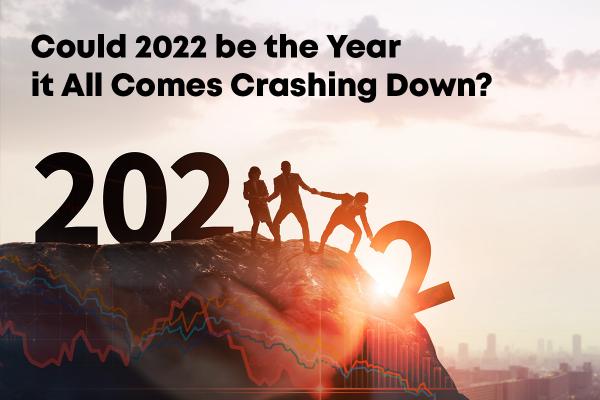The past two years have been quite the rollercoaster ride. In day-to-day life, the political climate and, of course, the stock market. After a flash crash following the arrival of the pandemic, equities have been on a seemingly endless upward trajectory, with only highly affected sectors like aviation and leisure lagging behind. As we embark upon 2022, the increasingly market-exposed population is asking one thing: how long can this unbridled growth continue?
Gurus and would-be prophets have been predicting a huge crash since as early as 2014, but the indices have just kept on trucking regardless. However, as the old adage says, what goes up must eventually come down, and there are certainly quite a number of headwinds at the moment. High levels of inflation, central bank stimulus tapering, and new coronavirus variants all threaten to slam the breaks on the runaway growth train. So, let's take a closer look at some of these risks and see what can be done to protect capital in the year ahead.
Inflating the bubble
The biggest macroeconomic worry of 2021 has undoubtedly been the above-target inflation that has significantly increased the costs of doing business, just as companies are trying to get back to normal. After much procrastination, the US Federal Reserve (and other world central banks) have finally bitten the bullet and announced combative measures, including stimulus tapering and interest rate hikes. Their reluctance to take these steps was quite understandable given their propensity for provoking a significant correction on the stock market.
Indeed, should the Fed keep its promise of three rate hikes in 2022, a 20-30% retracement is perfectly plausible. But that doesn't mean you should sell everything and hoard cash. Remember that inflation we're talking about? While taking some profit from overheated markets like the US tech sector is perhaps a good idea, there are plenty of equities that are still underpriced. Established value names like Berkshire Hathaway, Wells Fargo or Coca-Cola could be a good conservative move. However, the world is much bigger than the US, and those with a higher appetite for risk may want to consider some of China's beaten-down tech giants: Alibaba, Baidu and Tencent are all trading at around 40% below all-time highs.
Omicron and other mutations
While we're on the topic of China, it seems the perfect juncture to discuss the risk of Omicron and new coronavirus variants as a whole. Omicron was initially hailed as a saviour and the potential end of the pandemic due to its low severity and high transmission rate. Unfortunately, the poor efficacy of existing vaccines against Omicron is leading to an increase in hospitalisations among the vulnerable, prompting governments to consider additional restrictions and lockdowns.
This would obviously be bad news for the stock market and could be a catalyst for corrections in affected countries. Given that the virus is constantly mutating, the risk of such an event could be even higher if we see a variant that is as communicable as Omicron but which causes more severe disease.
As they say, though, any crisis is also an opportunity, one which vaccine manufacturers are already capitalising on. Pfizer and Moderna have begun developing Omicron-specific vaccines, and, in the meantime, booster programmes will mean even more profits for these companies. When we consider that these two stocks are down 10% and almost 50%, respectively, from all-time highs, this could be a good play to ride out any COVID-related volatility.
Cash for gold
Some people prefer to keep the risk to a minimum and are convinced that 2022 is going to be the year that the long-awaited crash finally comes. In that event, there are always traditional haven assets like gold and silver, not to mention less traditional alternatives like Bitcoin and Ethereum. These assets would also be a wise hedge against inflation, which Fed chief Jerome Powell has now admitted is likely to be a little more than just "transitory". It goes without saying that diversification is the key to investment success, and any sound portfolio should contain a precious metals (and crypto) allocation.
However, now might be the time to consider increasing your percentages of these asset classes. The yellow metal has hardly moved in a year, and silver is actually down almost 20% on reduced industrial demand, making them both smart buys at the moment. Besides physical gold and silver, there's even greater upside potential in mining stocks like Vale and Sociedad Química y Minera de Chile. As for crypto, there are also alternatives to owning physical BTC or ETH on a cryptocurrency exchange, with products like the Grayscale Bitcoin Trust offering an excellent method of gaining exposure to this space without the hassle of navigating the crypto sphere.
Libertex Invest for long-term investors
Whether or not 2022 is the year the crash finally comes, do your best to protect yourself from any possible drawdowns. If you do your due diligence and avoid buying at all-time highs, you've already done the hard bit. For long-term investors, Libertex Invest could be just the product they've been looking for. This new account type offers zero commission and comes with a wide variety of advantages over CFD trading. Best of all, it actually allows you to own shares with all of the dividends. For more information or to create an account, visit http://www.libertex.com/invest
Risk Warning: CFDs are complex instruments and come with a high risk of losing money rapidly due to leverage. 75.3% of retail investor accounts lose money when trading CFDs with this provider. The value of investment in stocks and shares can fall as well as rise. Market spreads apply. You should consider whether you understand how CFDs work and whether you can afford to take the high risk of losing your money.
Jurisdictional limitations: Libertex Invest is only available in EEA countries.


